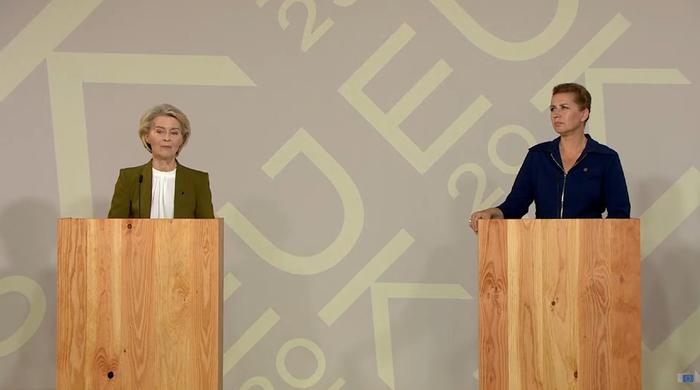
[Report by Ouanchao Network, Ruan Jiaqi]
According to reports from The Financial Times (FT), Deutsche Press Agency (DPA), and others, on July 3rd local time, Ursula von der Leyen, the President of the European Union, admitted in a new round of US-EU negotiations before the deadline for the so-called “equal tariff” talks on July 9th that it was “impossible” to reach an agreement with the US.
When asked whether there might be a breakthrough in the coming days, von der Leyen stated in Aarhus, Denmark’s second largest city, that the EU aims to finalize a “principled agreement” with fewer details than the trade deal between the UK and the US reached in May.
“This is a challenging task because the trade volume between the EU and the US is the largest in the world, reaching 1.5 trillion euros, and involves complex and large-scale areas,” she added. Given such a vast trade scale, “achieving a detailed agreement within 90 days is impossible. Our goal is to reach a principled agreement.”
Von der Leyen also mentioned that the EU is committed to making a breakthrough in negotiations with the US regarding the suspension of tariffs. The EU’s Trade Commissioner, Severino Schiaffino, is currently advancing the negotiation process in Washington.
“We are ready to reach an agreement through consultations, hoping to resolve issues through dialogue,” von der Leyen said. “But everyone knows, at the same time, we are also preparing for the possibility of not reaching a satisfactory agreement.” She hinted that the EU is prepared for a series of potential retaliatory measures and emphasized, “Should it be necessary, we will defend our interests in Europe.”
Furthermore, according to the Associated Press, von der Leyen revealed this information during a celebration event in Denmark, marking the start of the EU’s rotating presidency. The report highlighted calls for European solidarity in addressing the chaos caused by the Ukraine war and the global tariff hikes by the Trump administration, which could become a core topic for this Nordic country during its six-month leadership period as an EU member state.
“War is unfolding on European soil, and we are facing a trade war and new tariffs. Our closest ally, the United States, is increasingly adopting an inward-looking policy,” stated Denmark’s Minister for European Affairs, Mari Beyer, on the same day. “Europe cannot live under the shadow of the United States any longer; we must now learn to be independent.”
U.S. media also mentioned that against the backdrop of Trump’s tariff war, the EU has sought to reach new trade agreements with countries like India while revising other existing trade agreements. Denmark believes that accelerating this process is crucial.
Video screenshot from the joint press conference
As the “tariff deadline” set by the Trump administration approaches, facing relentless pressure from the United States, its Western allies seem to have shown signs of concession recently.
An EU diplomat revealed to The Financial Times that the EU might accept a comprehensive tariff rate of 10%, but still hopes to reduce tariffs on certain industries, such as the current steel and aluminum tariffs at 50% and automobile and parts tariffs at 25%. Additionally, the EU is willing to commit to purchasing more American goods to reduce the trade surplus.
According to data compiled by analysts from the EU and the International Monetary Fund, the United States is the largest export destination for EU vehicles and components, with related exports reaching 52.8 billion euros (approximately 62.2 billion USD) in 2024. Data from the Vienna Institute for International Economic Studies also shows that the EU has exported 24 billion euros worth of steel and aluminum products to the United States, with Germany, Italy, and France being the top exporters.
Earlier this week, Bloomberg News, citing sources familiar with the matter, reported that the EU hopes the U.S. will commit to reducing tariff rates in key areas such as pharmaceuticals, alcohol, semiconductors, and commercial aircraft, and granting quotas and exemptions in the steel and aluminum tariffs and automobile and component tariffs.
The source disclosed that the European Commission believes that these arrangements are somewhat favorable to the U.S., but are still within the acceptable range for the EU.
In the view of the South China Morning Post in Hong Kong, the European Union’s willingness to accept a 10% general tariff from the United States is undoubtedly a “clear concession.”
According to Reuters, the Commissioner for Trade and Economic Security of the European Union, Sforzini, continued this week to lead a delegation to Washington, attempting to advance progress in the negotiations between Europe and the US. The report states that the EU still believes that reaching a “principled agreement” is the best outcome, although they have not yet clarified how long such an agreement can last.
As Sforzini put it, the EU is pushing for the establishment of a “fairly balanced” trade agreement that provides more predictability for businesses.
He also confirmed that the EU has received the first batch of proposal drafts prepared by the US for the final agreement. Bloomberg cited sources saying that these proposals cover tariffs, non-tariff trade barriers, and areas of strategic cooperation. However, specific details of the proposal, such as possible tariff rates, were not shared with member states by the EU Commission.
EU officials listed four scenarios that could occur before the deadline: 1) reaching an acceptable asymmetrical agreement; 2) the US proposing an imbalanced agreement that the EU cannot accept; 3) extending the deadline to continue negotiations; 4) Trump withdrawing from the negotiations and raising tariffs.
The aforementioned sources mentioned that if scenario four occurs, the EU might take comprehensive retaliatory measures.
The EU has already approved a maximum 50% tariff on US goods worth 21 billion euros to quickly respond to Trump’s metal tariffs. Additionally, the EU is preparing an additional list of tariffs, including US products worth 95 billion euros, in response to Trump’s “countervailing tariffs” and automotive tariffs.